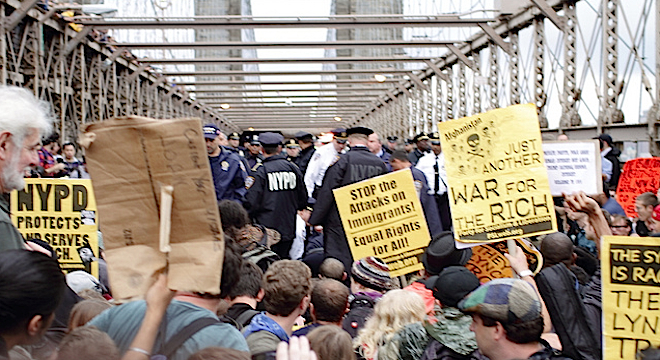Updated 2:22 p.m. EDT, Friday, September 14
After four months of contesting, Twitter has finally handed over account information and tweets of one of its users, an “Occupy Wall Street” protester, to a New York Criminal Court judge on Friday, the Associated Press reported.
“As a pure matter of law, today Twitter is being given a fundamentally unfair Hobson’s choice that is contrary to the core of our justice system of being compelled to either waive its right to appeal so that novel legal issues may be adjudicated on the merits, or being held in criminal and/or civil contempt,” said Twitter’s outside counsel, attorney Terryl Brown, in comments made to the New York City Criminal Court on Friday and provided to TPM.
The case, which legal experts said could become a landmark one for free speech in the electronic age, concerned “Occupy” protester, writer and Twitter user Malcolm Harris, who was arrested in October 2011 along with around 400 other demonstrators during a march across the Brooklyn Bridge.
Harris, who was charged with disorderly conduct and released, has pleaded not guilty.
But the Manhattan District Attorney’s Office in January 2012 subpoenaed Twitter as a witness in its criminal case against Harris, asking the San Francisco-based company to provide “any and all user information, including email address, as well as any and all tweets posted” by Harris’s Twitter account at the time, @destructuremal, during the period of September 15, 2011 through December 15, 2011.
Harris, through his attorney, challenged the subpoena in February but New York Criminal Court Judge Matthew A. Sciarrino, Jr., rejected the challenge.
Then in May, Twitter stepped up and filed an extensive motion to quash the order for Harris’s tweets and account information, arguing that complying with the order went against the Fourth Amendment right to unreasonable search and seizure, as well as several subsequent related laws protecting user-generated content.
Judge Sciarrino in July ruled against Twitter’s motion, writing that if “you post a tweet, just like if you scream it out the window, there is no reasonable expectation of privacy.” Twitter in late August appealed the judge’s decision, arguing the court had misunderstood how Twitter worked.
But with the appeal not scheduled to be heard by an appellate court in November, on Tuesday, September 11, Sciarrino did not stay the order for Harris’s information. Rather, he again ruled that Twitter needed to hand over the information, stating that if the company did not due so by Friday, September 14, it would be liable to a fine.
The original subpoena said the fine for non-compliance could be as high as a thousand dollars or involve imprisonment for up to year, but Sciarrino had said he wanted to see Twitter’s income statements to determine the precise amount.
As it turns out, Twitter did not elect to face the fine, instead turning over the information as requested. Twitter declined to comment for this article, referring TPM to the statement made by its counsel to the New York Criminal Court, which can be read in full here.
Judge Sciarrino did end up siding with Twitter’s rationale on one point, The Associated Press> reported, agreeing to review the information and withhold from the Manhattan DA those tweets that are less than 180 days old, in compliance with the Stored Communications Act, which states that such content needs a search warrant in order to be accessed by law enforcement.
Harris, for his part, isn’t exactly sure what the contents of the information that Twitter handed over to the Judge are.
“Not sure what Twitter handed over, I just saw a big pile of paper,” he tweeted from his new account, @BigMeanInternet, on Friday, in response to a question asked by TPM.
Harris earlier tweeted that his information would remain sealed until a hearing on September 21, 2012. Harris told TPM that the hearing was an Article 78 hearing for a “writ of mandamus.”
“It’s like a non-appeal appeal,” Harris tweeted.
An Article 78 proceeding is specifically initiated for the purpose of appealing the decision of a New York State court, but “New York courts very often decide in favor of the agency if the agency has written down some reason for its decision,” according to legal assistance blog LawNY.org.
Harris’ criminal trial is set to begin in December.
Twitter, for its part, has consistently fought requests for information by U.S. law enforcement authorities, frequently losing, and has committed to posting requests for content takedown notices and compliance with those requests on the website ChillingEffects.org and its own blog.
Late update: Updated to add Twitter outside counsel Terryl Brown’s statement at the top of the article, as well as to clarify that Twitter declined to comment for this story outside of the statement from Brown.






